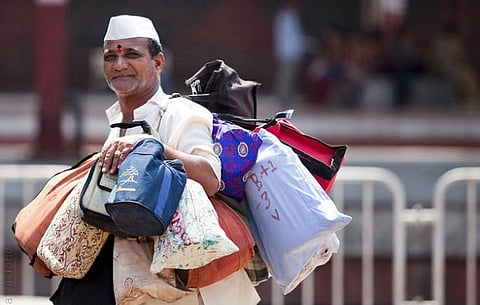Dabbawallas of Mumbai
Speaking about the most inspirational success stories of entrepreneurship in India, one can never miss mentioning the Dabbawallas of Mumbai. A success story so unparalleled and remarkable that it grabbed the attention of the great leaders of the world.
Yes, the story of Dabbawallas swept Prince Charles, Prince of Wales, and Richard Branson, the English business magnate, investor, and philanthropist, off their feet with their phenomenal devotion to the food delivery service.
Leading publications namely Forbes Global Magazine and The New York Times have featured articles on the uniqueness of the business idea and Dabbawallas' Six Sigma-rated service quality.
The business system on which Dabbawallas carry out everyday operations has been selected as a case study by the world's leading institutions, such as Harvard Business School and IIM, Ahmedabad.
So, let's know more about these Dabbawallas and their business that has stunned the world. Acknowledged as the most efficient Human Logistics Network in the World, the Dabbawala industry is the lunch delivery system in which nearly five thousand dabbawallas serve nearly two lakh people a day.
Every day, dabbawallas (men with Tiffin boxes) collect homemade food in lunch boxes from people's residences or central kitchens and deliver them to respective workplaces through multiple modes of transport, usually bicycles and railway trains.
Once the lunch hour is over, the empty dabbas are collected from the office and delivered to the customer's residence before evening.
To imagine the management of two lakh dabbas by five thousand employees every day, within two hours, from one corner to another in Mumbai using local trains, definitely seems to be baffling.
However, the business system is so well designed and planned that only one error makes its way into eight million transactions ( as revealed by Forbes Global Magazine).
To escape mismanagement, there is a colour coding system to identify the destination and recipient. Then, accordingly, lunch boxes are marked based on abbreviations for collection points, colour code for starting station, the number for the destination station, and markings for handling dabbawala at the destination.
Everyday day, a Dabbawalla wearing a white kurta pyjama and white Gandhi cap collects the lunch boxes from residences or central kitchens. Then they take them to a designated sorting place, where he and other collecting Dabbawallas sort the lunch boxes into groups.
The boxes separated into groups are loaded into the train coaches, with specific markings that indicate their destination. The markings mention the railway station where boxes need to be unloaded as well as the address of the destination building.
A local dabbawala placed at every station is handed over all the boxes to be delivered. In the same way, the empty boxes are collected after lunch and delivered back to the respective houses.
The journey of the dabbawalla industry started in 1890 when a Parasi banker asked a dabbawalla to deliver home-cooked food regularly to the office. Soon, the idea of having fresh homemade food at the workplace enticed other people, and demand for dabbawalla service shot up.
The value of this service sparked the entrepreneurial flame of a great visionary, Mr. Mahadeo Havaji Bachche, and he started the lunch delivery service with a team of hundred Dabbawallas the same year.
In 1968, the service was launched commercially under the name Mumbai Tiffin Box Supplier's Association. Today, the net worth of the dabbawalla industry is forty to forty-five crore and every dabbawalla is paid around eight thousand rupees a month, irrespective of the role he performs.
With their remarkable efforts and dedication, these dabbawallas have scaled up a conventional service into a highly organized industry. The organizational and management skills employed by them are quintessential to achieving end goals in any business.
Identifying themselves as members of Shivaji's warrior clan, these dabbawallas have been showcasing remarkable expertise in organization, operational management, time management, teamwork, and unwavering commitment to customer service. They have faithfully offered uninterrupted food delivery services to a vast clientele for the past 127 years, without fail.
Share My Dabba
The Dabbawallas joined hands with Happy Life Welfare Society in their social initiative, 'Share My Dabba', towards spreading smiles on the faces of thousands of poor street children who have no option but to stay hungry throughout the day.
Around two lakh people use the dabbawalla service daily and it is obvious that many people leave some food in their Tiffin. As a part of this service, volunteers of the society distribute 'Share My Dabba' stickers to people availing of the dabbawalla service.
Those who want to share their lunch with poor children paste the sticker onto their dabbas. The volunteers reach the point where dabbawallas assemble after having collected the lunch boxes post-lunch.
The dabbas with stickers are simply kept aside while the dabbawallas sort the ones without stickers. During that duration, volunteers give the food to children and repack the dabbas, which are sorted out later.

